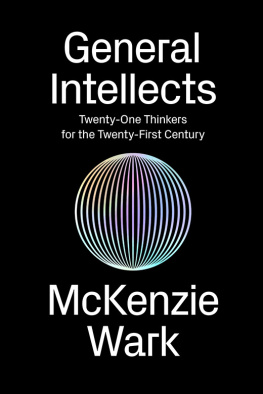GENERAL
INTELLECTS
Twenty-One Thinkers for the
Twenty-First Century
McKenzie Wark

A Public Seminar book
First published by Verso 2017
McKenzie Wark 2017
All rights reserved
The moral rights of the author have been asserted
1 3 5 7 9 10 8 6 4 2
Verso
UK: 6 Meard Street, London W1F 0EG
US: 20 Jay Street, Suite 1010, Brooklyn, NY 11201
versobooks.com
Verso is the imprint of New Left Books
ISBN-13: 978-1-78663-190-9 (PB)
ISBN-13: 978-1-78663-283-8 (HB)
eISBN-13: 978-1-78663-192-3 (US)
eISBN-13: 978-1-78663-191-6 (UK)
British Library Cataloguing in Publication Data
A catalogue record for this book is available from the British Library
Library of Congress Cataloging-in-Publication Data
Names: Wark, McKenzie, 1961 author.
Title: General intellects : twenty-one thinkers for the
twenty-first century
/ McKenzie Wark.
Description: New York : Verso Books, 2017. | Includes
bibliographical
references.
Identifiers: LCCN 2016048999 | ISBN
9781786631909 (alk. paper)
Subjects: LCSH: IntellectualsHistory21st century. |
PhilosophyHistory21st century.
Classification: LCC HM728 .W365 2017 | DDC
109.2/2 [B] dc23
LC record available at
https://lccn.loc.gov/2016048999
Typeset in Minion Pro by MJ & N Gavan, Truro, Cornwall
Printed in the UK by CPI Mackays
For my students at the New School
the general intellects to come
Contents
Where are the public intellectuals like we used to have back in the good old days? Whenever one talks about the figure of the public intellectual, one is supposed to talk about their decline. There is no more Sartre nor de Beauvoir, no more Pasolini, no more James Baldwin. One might ask why the figure of the public intellectual always seems linked to this sense of decline. Or, one might ask about who is writing right now who ought to be part of some sort of general discussion.
To sidestep the whole mlange of habitual feelings and assumptions about the public intellectual, lets call it something else. Lets talk about general intellects. Theres a famous text by Marx, now usually called the Fragment on Machines, in which he talks about the general intellect. Ill come back to that later. To shorthand it for now, the general intellect might be Marx groping for a way to think the role of something like intellectual labor in the production process.
For now, lets just pose the problem of the public intellectual in relation to the general intellect. Perhaps the story of the decline of the public intellectual has to do with intellectual labor being finally absorbed into the production process. It isnt a question of the personal failings of the intellectuals of today to live up to the fabled standards of yore. Todays intellectual workers have to work in a different system. A system which in a much more refined way slots them into processes of extracting value from their work. One just doesnt get to be a Sartre or a de Beauvoir even if one wanted to be.
To follow that example just for a bit: they were able to make a living by their pen and typewriter. There was a culture industry based on mass printing. There was a rapidly expanding field of higher education producing readers for their books. And, lets not forget: they were products of an elite education system, in countries where that still bestowed an aura of prestige and entitlement. Of course, this is a crude sketch, but the basic point is that doing intellectual work today confronts very different circumstances. It would be pretty much impossible to write intellectually challenging books and make a living from it. Today one needs a day job, and usually in the university.
The university is not what it used to be, either. Rather than being a distinct kind of institution that produces people who could run a capitalist society, its becoming itself a business. Academic labor has to work within systems of management that are derivative of other kinds of management of intellectual labor. It is becoming quantified and stratified. Much of the labor is becoming casualized. In some cases, the university seems to imagine it can get along quite nicely without the traditional disciplines that tried to think about historical, social or political events.
So there could be reasons for the decline of the public intellectual, and not all of them self-inflicted. Those who think the problem is that todays academics write too much jargon should look at the business press. Was ever there a language more filled with spurious, made-up words of indeterminate meaning? But rather than engage with the standard stories of the public intellectual, lets think instead about general intellects. By general intellects, I mean something a bit different to Marxs formula of the general intellect, although they might be connected. By general intellects, I mean people who are mostly employed as academics, and mostly pretty successful at that, but who try through their work to address more general problems about the state of the world today.
They are, on the one hand, part of the general intellect, in that they are workers who think and speak and write, whose work is commodified and sold. But they are, on the other hand, general intellects, in that they try to find ways to write and think and even act in and against this very system of commodification that has now found ways to incorporate even them. They try to address a general situation, one that many people find themselves in today. And they try to do so intelligently, by applying their training and competence and originality.
I have chosen to write about twenty-one such general intellects. Most are academics, but they come from different disciplines. They are not the only people one might usefully read at the moment as talking about some part of the puzzle of confronting the contemporary situation. That situation, most people might agree, is rather bleak. Unless you are part of that tiny handfulthe so-called 1 percentwhose fortunes have soared, then things are likely to appear as a spectacle of disintegration. The forward momentum of commodification seems to result mostly in the destruction of both nature and social life.
And so what follows are readings of general intellects who I think have made some progress on thinking about such things. But it seems likely that if general intellects have to work under conditions in which they are just component parts of the general intellect, whose sole function is to keep commodification going and profits flowing, then this will in some way disfigure the work and limit its ability to grasp the general situation.
This is why the readings I offer are appreciations, but critical ones. Two things seem to me to need more attention than they usually get. One is the development of new forces of production. Information technology seems to me something qualitatively different to previous regimes of mechanical and thermodynamic means of production. Moreover, information technology seems to me to be transforming the whole social formation, permeating everyday life and shaping strange forms of surveillance and control.
The second thing is an unexpected effect of how information technology has also found its way into the sciences. We now know the global consequence of endlessly commodifying all the resources of the planet: it will crash. Climate change is just the most pressing aspect of what are now often grouped together as the signs of the











